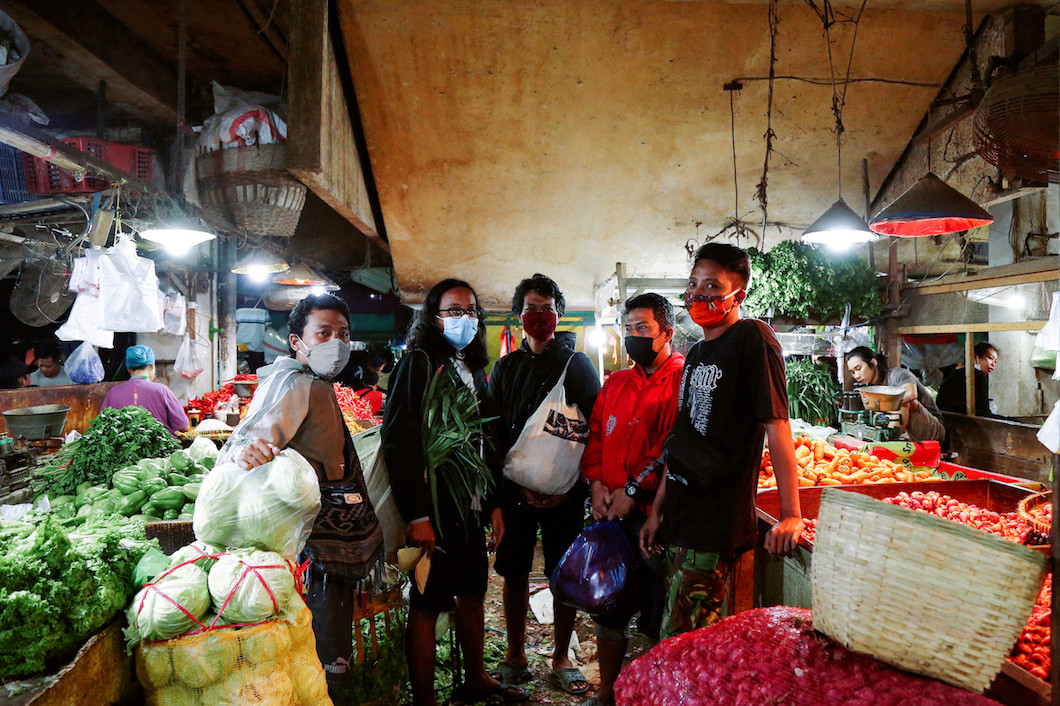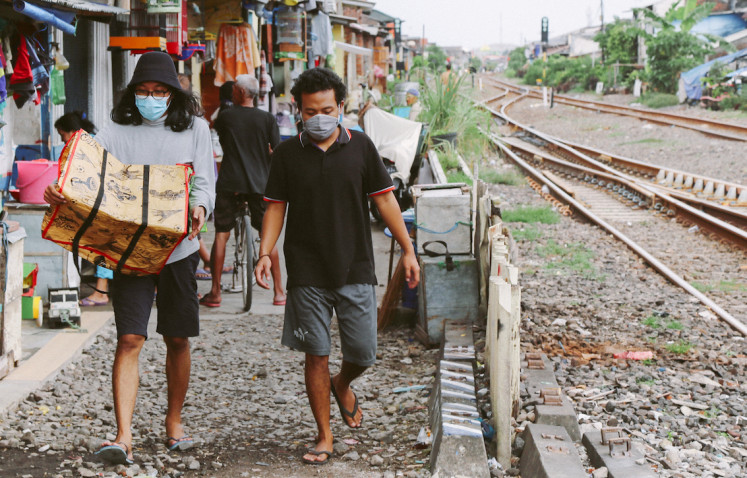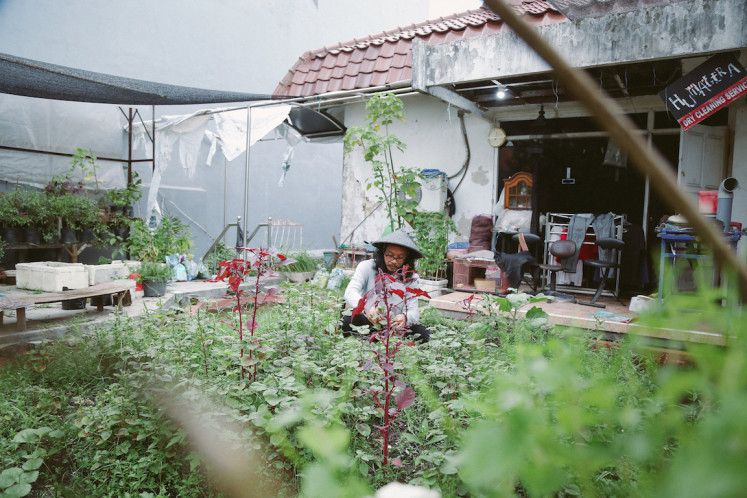Pawon'e Arek-Arek collective frees people from fear of hunger
Started by a group of 30-somethings, a charity movement is growing and distributing food as an independent collective to help people in need.
Change Size

T
he setting sun accompanied Yoyo, Rempel, Ryan and fellow volunteers to a market in the East Java capital, while the incoming dark clouds that seemed to hover overhead prompted them to hurry.
Clutching sheets of brown recycled paper, they were ready to hunt for their groceries, scattering in all directions on arriving at the market. Less than an hour later, they regrouped, holding big bags filled with a variety of foodstuffs, from vegetables to fresh chicken and to spices that were ready to be chopped and fried into snacks.
Yoyo, Rempel and Ryan, all in their early 30s, are cofounders of a food charity called Pawon'e Arek-Arek, meaning “kitchen guys”. They dislike the term "founders" and prefer “volunteers" instead. "No gods, no masters," they say, all asking not to use their full names. The charity distributes free food weekly to people who are struggling to survive the COVID-19 health emergency in suburban villages, or kampungs.
"Initially, this program was created to meet the needs of [people we knew personally]. Many of us have been badly affected by the pandemic. We faced reduced incomes or job loss,” said Yoyo.
“After the pandemic had gone on for a month, we began to see another urgency. Aside from us, others were also in need, suffering from the situation just like we do,” he added, which led the trio to launch the movement on June 1, 2020.
Their activities run from dusk till dawn. At 5 p.m., the volunteers of Pawon'e Arek-Arek can be found busily grinding spices, preparing broth and chopping vegetables in the living room. On the day that I visited, they were busy preparing chicken soup for distributing the next day.
Yoyo, Rempel and Ryan said Pawon’e provided the “simple hope” that through solidarity, everyone can survive and outride the health crisis together.
"We’re doing this because everyone has the right to be free of hunger," said Yoga, another volunteer also in his early 30s.

Maryati, a 51-year-old who lives in a kampung next to the Wonokromo railway, agrees. Living in a densely populated makeshift settlement, she says that the community always looks forward to the Pawon’e volunteers’ arrival.
She also said that life had gotten increasingly difficult lately after her husband, who worked as a security guard at a private company, lost his job. Maryati and her family now relied on informal jobs like sorting used plastic cups to survive.
"That's why the arrival of those [guys] helps us a lot. Thanks to them, we can have free meals. This allows us to save up a bit, because the situation is really difficult," Maryati said while eating the chicken soup from Pawon'e Arek-Arek.
Collective Strategy
Pawon'e Arek-Arek is run as an independent and open collective, so it is not uncommon for its volunteers to hail from the very kampungs they are helping. According to Yoyo, this is why they never have any trouble setting up distribution points.
"We don't actually have a special strategy running this program, because it has become a daily habit. We distribute food to [kampung] residents who are also our friends. All of us here are like comrades and anyone has the right to provide information about their kampung if they need help," said Yoyo.
Pawon'e Arek-Arek’s weekly budget comes entirely from communal contributions. Yoyo said the volunteers had declined donations offered by third parties, as they were concerned that personal agendas would “break” the collective.
"This is purely a community movement, done to help the people [of our community]. As much as possible, it should be [free] from personal agendas. There have been many political philanthropic institutions that wanted to provide financial assistance, but they told us to include their logo in our activities. Of course, we refused. We’re certain that we will always manage to fund ourselves, ” said Yoyo.
Urban farming and food independence
Some Pawon’e volunteers have independently initiated an urban farming movement called Humatera, which often supplies food ingredients, especially vegetables, to Pawon'e Arek-Arek. Although it is unable to meet all needs, Humatera is trying to achieve food self-sufficiency, at least for daily needs.
Humatera has a small rooftop garden on the terrace of the Kerjasama 59 art collective and bookstore in Surabaya. It grows a variety of vegetables including chilies, spinach, kale and tomatoes. It also cultivates vegetables on an empty 1-hectare land in the Keputih area of Surabaya that was donated by one of its volunteers. Before that, the group used abandoned lands to grow crops.

"Apart from supplying Pawon'e, Humatera also brands itself as a ‘space activation movement’,” said Yoyo. “The lack of land in the city urged us to create [agricultural] space,” he added, and that the activity had helped the volunteers to realize that they eat what they cultivate by managing agricultural land.
As with Pawon'e Arek-Arek, Humatera distributes any surplus yield from their harvests to its communities and volunteers for free. The group’s main goal is not to make a profit, but to ensure that food needs are met.
For Yoyo, farming is also a way to reflect on life. He always allows the soil to “rest” for three to four weeks after a harvest. Like the human body, land also needs a break, he says.
“We treat the land, plants and farming activities like we treat ourselves. They need rest so they don't continue to be exploited,” he said.
“We consider it a pause when we or the land can rest from the fatigue of surviving in a noisy city. Urban farming is not just a means of releasing stress from the pandemic, but also a means of supporting life, a means of surviving.”









